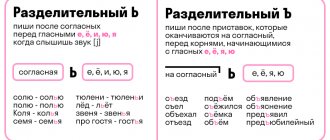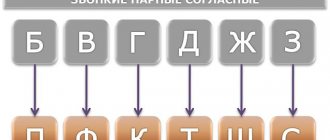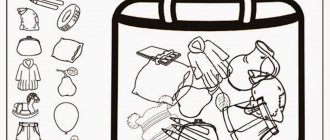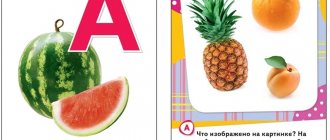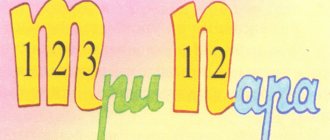Letter ь
So which words have more letters than sounds? First of all, in those that have b. This letter is written in words to indicate the softness of consonants. And such a sound in an audible word is expressed by one phoneme.
As a result, the word will have more letters than sounds, for example:
- bathhouse - six stars, [ban'ka] - five stars;
- news - five b., [v'es't'] - four stars;
- guest - five stars, [gos't'] - four stars;
- rain - five stars, [dosht'] - four stars;
- life - five stars, [zhyz'n'] - four stars;
- horse - four stars, [kon'] - three stars;
- laziness - four stars, [l'en'] - three stars;
- mole - four stars, [mol'] - three stars;
- zero - four stars, [zero'] - three stars;
- password - six characters, [password'] - five stars;
- role - four stars, [roll'] - three stars;
- herring - six stars, [s'el'd'] - four stars;
- darkness – six stars, [t'emin'] – five stars;
- chain - four b., [tsep'] - three stars.
The separating soft and hard signs, as a rule, do not affect the difference in the number of letters and sounds. This is explained by the fact that the letters e, e, yu, i after b and b denote two phonemes, one of which is [th]. This means that in such words the letters and sounds will remain in equal numbers.
The soft sign influences the difference in the count of phonemes and graphic signs when placed after sibilants. However, it does not affect pronunciation and serves to indicate the grammatical form of the word:
- nouns of the 3rd declension: rye [rosh] (four b., three stars), daughter [doch'] (four b., three stars), brooch [brosh] (five b., four stars);
- adverbs (except for exceptions: already, married, unbearable): away [other'] (five b., four stars), wide open [nast'esh'] (seven b., six stars);
- verbs: help [help'] (six b., five stars), don't touch - [trosh'] (five b., four stars), look [pasmotr'ish] (ten b., nine stars).
In these words, as we see, there are more letters than sounds.
Practical task No. 1
We offer several practical tasks to reinforce the material.
1. Do I need to insert ь in place of the ellipsis? Determine which words have more letters than sounds:
- glass...shield;
- fifteen;
- bow;
- seven...ten;
- nyan...chit;
- bridge;
- lamplighter;
- river...ka;
- five...hundreds;
- fan...tick.
2. Which words have more letters than sounds?
Elk chews grass, branches, bark. He needs to lick the salt. The forester takes the salt head into the forest and places it on a stump. This is where the moose comes to lick the salt.
2. Is a soft sign placed after hissing ones? Determine which words have more letters than sounds:
- roof edges...;
- crying is heard...;
- impatient... to begin;
- got married…;
- cut... bread;
- forest wilderness...;
- the air is fresh...;
- put... a brick...;
- expanses of pastures...;
- let's go... at a gallop...;
- strained… vision;
- mighty oak...;
- huge clouds...;
- you’ll go... to the forest spring for water...;
- obedient daughter...;
- eat...those rolls...;
- open... your cloak...;
- lie down... on the bench;
- spread... sandwich;
- lily of the valley... fragrant...;
- solve... five problems...;
- open... the doors wide...
Letters E, E, Yu, Z
In addition to the soft sign that does not indicate sound, there are letters that serve as graphic signs of two phonemes. It depends on their position in the word. After soft consonants, they indicate their palatalization (softening) and do not in any way affect the difference in the number of letters and sounds. Another thing is in other provisions:
- at the beginning of the word: ate [yel] – two b., three stars;
- after vowels: loan [zayom] – four b., five stars.
Here are examples where there are more sounds than letters. Let us recall that after b and b also [th] appears. But this does not affect the difference between the sound and graphic expression of a word.
Practical task No. 2
1. Determine which words have the same number of phonemes and their graphic symbols:
- two-tier pavilion;
- drove into the entrance;
- curious monkey;
- three-story house;
- pre-exam anxiety;
- irreparable defect;
- bear paws;
- pre-anniversary activities;
- television filming;
- drink broth;
- bird feathers;
- strong blizzard.
2. Find words that have sounds and letters in different quantities.
Do you think there is bird milk? However, this is not unusual at all. Ordinary pigeons feed their chicks with bird's milk. It appears in the crop of pigeons and resembles a white pulp. It is also called goiter. In pigeons it is not secreted for long - eighteen to twenty days.
Unpronounceable consonants
In addition to the above phonetic phenomena, sounds and letters are contained in different quantities in words with unpronounceable consonants:
- imperious [powerful] – eight points, seven stars;
- sun [sontse] – six points, five stars;
- festive [celebratory] – eleven points, ten stars;
- famous [izv'esny] – nine b., eight stars.
If there are unpronounceable consonants, then these are words where there are more letters than sounds.
It must be remembered that the spelling “unpronounceable consonants” must be checked with a strong position. In some cases there are no such letters:
- terrible [terrible] – seven b. and seven stars;
- peer [rov'esn'ik] – eight points, eight stars;
- tasty [fkusny] – seven b., seven stars.
Double consonants
There is also such a thing as double and double consonants. If they are present in a word, we will also have a discrepancy in the quantitative composition of sounds and letters, for example:
- television antenna [antena] – seven points, six stars;
- friendly team [kol'ikt'if] – nine points, eight stars;
- old yeast [shivering] – six points, five stars;
- artificial crystal [krystal] – eight b., seven stars.
- station [station] house - eleven points, ten stars;
- glass [st'ikl'any] – ten b., nine stars.
These words have more letters than sounds.
Changing the quality of sounds
Simplification is often observed in words where consonants occur. Then, instead of several sounds, one is pronounced, which differs in quality from the original ones. For example:
- hidden from view [skryvaitsa] – ten b. and nine stars;
- great athlete [sportsman] - nine points, eight stars;
- city [Garatsk] resident - nine b., eight stars.
Practical task No. 3
1. Determine which words have more letters than sounds:
- feel disappointed;
- participate in competitions;
- inappropriate question;
- peer of my parents;
- long eyelashes;
- private person;
- dangerous age;
- rainy day;
- delicious dishes;
- linden alley;
- quarrel with friends;
- captured territory;
- file an appeal;
- art;
- delicious cake.
It rained at night, but in the morning the weather was wonderful. Peers and peers walked to school. Everyone was in a joyful mood. Not far from school, the children smelled the distinct scent of roses. These were the blooming bushes that the graduates had planted back in May.
Source: fb.ru
Source: https://monateka.com/article/180719/
And the last exercise
To consolidate the result, I suggest saying pairs of words with sounds | n | and | ŋ |. Remember everything you learned today. Go!
sin|sin| – sing |siŋ| thin |θɪn| – thing |θɪŋ| gone |ɡɒn| – gong |ɡɒŋ| ran |ræn| – rank |ræŋ| kin |kin| – king |kiŋ| win|win| – wing |wiŋ| tin |tɪn| – ting |tɪŋ| fan |fæn| – fang |fæŋ| ton |tʌn| – tongue |tʌŋ| ban |bæn| – bang |bæŋ|
Happened? Congratulations! Now all that remains is to learn the correct pronunciation of these sounds during fluent speech. The only way is practice, practice, practice. So we suggest you save our article and repeat the workshop periodically.
When there are more sounds
Let's figure it out: when there are more sounds than letters, and when there are more letters than sounds, or when there is an equal amount of everything.
Look, below are words that have more sounds than letters. This happens due to one distinct pattern.
- Words have iotated letters that denote 2 sounds in a certain position - two vowels are located next to each other.
- Yama (noun) – 3 letters, 4 sounds, the letter “I” gives two sounds [j'a].
- Three (numeral) – 4 letters, 5 sounds, the letter “E” gives two sounds [j'ь].
- Having left (perfective participle) – 6 letters, 7 sounds, the letter “E” gives two sounds [j'ь].
- Barked (verb) – 7 letters, 8 sounds, the letter “I” makes two sounds [j'ь].
- Company (noun) – 8 letters, 9 sounds, the letter “I” makes two sounds [j'ь].
- Moved (verb) – 9 letters, 10 sounds, the letter “E” makes two sounds [j'e].
- But in this series of words something else is noticeable: the presence of a soft sign and an unpronounceable consonant sound.
- Ten (numeral) – 6 letters, 5 sounds, because “b” does not indicate a sound.
- Sad (adjective) – 8 letters, 7 sounds, [t] is not pronounced.
- Locality (noun) – 9 letters, 7 sounds, [t] is not pronounced, “b” does not indicate a sound.
- Feel (verb) – 13 letters, 11 sounds, [v] is not pronounced, “b” does not indicate a sound.
- Here there are equal numbers of sounds and letters, since there are 2 conditions: the presence of a soft sign and an iotized letter.
- Yes (verb) - 4 letters, 4 sounds, because “b” does not indicate a sound, and the letter “E” gives two sounds [j'e].
- Appeared (verb) - 9 letters, 9 sounds, because “b” does not indicate a sound, and the letter “I” gives two sounds [j'ie].
- You are offended (verb) - 10 letters, 10 sounds, because “b” does not indicate a sound, and the letter “E” gives two sounds [j'ь].
- Serious (adjective) - 10 letters, 10 sounds, because “b” does not indicate a sound, and the letter “Ё” gives two sounds [j'о].
- Spring (noun) – 5 letters, 5 sounds, because the iotized letter “E” comes after a consonant.
Example words
There are quite a few lexemes in the Russian language in which there are more sounds than letters - this phenomenon is considered quite widespread.
Runs: phonetic analysis of the word
Let's look at a few examples:
- eralash – “yiralash”,
- apple - “yablaka” (also apple and the like),
- caustic – “yetk`iy”,
- raccoon – “yinot”,
- fir tree - “yolka” (fir tree is not suitable, because there is “b”, it equalizes the meaning),
- capacious - “yomk`iy” (capacity is not suitable, because there is “b”, it equalizes the value),
- lawyer – “yur`ist”,
- hawk – “yastr`ip”,
- young man - “yunasha” (youth is not suitable, because there is “b”, it equalizes the meaning),
- piano – “rial`”,
- despondency - “discouragement”,
- light – “sv’etlaya”,
- beautiful - “kras`ivaya”.
Examples can be supplemented with other feminine adjectives (happy, wise, beloved, stranger and others).
This is interesting! What is the difference - to wear or dress, how to write correctly
3 letters and 4 sounds
Below are words that also have an unequal number of sounds, compared to graphic signs:
- yama - "yama"
- yula – “yula”,
- comfort - “coziness”,
- food - "yida"
- neck – “sheya”,
- I sing - “payu”,
- ruff – “yorsh”,
- thuja – “thuja”.
Yula: phonetic analysis of the word
3 b. and 4 stars in a lexeme it can be if it contains vowels that break down into 2: e, e, yu, i. This occurs in cases where the indicated vowel is at the beginning, or it comes after another vowel.
5 sounds and 4 letters
In these examples, the number of phonetic and graphic signs is also not equal:
- lighthouse - "lighthouse"
- give – “dayut”,
- sings - “poyot”,
- snake – “snake”,
- washes – “washes”,
- yours - “svayo”,
- bright - "yarka"
- raccoon – “yinot”.
Hedgehog: phonetic analysis of the word
There are fewer graphic signs than sounds; for the same reasons, e, ё, yu, i break down into 2 meanings, because they are in the initial position or after a vowel.
This is interesting! Where is the correct accent in the word beet?
Which words have more sounds than letters in Russian: list of words
In this article we will talk about which words in the Russian language have more sounds than letters. Read on for details.
It is not for nothing that the Russian language is considered difficult and rich in synonyms and various rules for spelling certain words. Children learn grammar already from the first grade and this store of knowledge does not fit into several years.
Even in adulthood you can learn something new in the Russian language. It is interesting that there are words in which the number of sounds and letters does not match. It happens that there are fewer letters, but more sounds.
Why is what is written different from what is said? Let us consider further and find out which words have more sounds than letters.
If you parse the word phonetically, the result will be the following picture: the number of sounds will not correspond to the number of letters in the word. It often happens that there are more sounds in words than the letters themselves.
And if you also know which words have more sounds than letters in the Russian language, then you will definitely remember the information that the teacher taught at school.
Below is a picture where there are examples of the correct spelling of words and their phonetic analysis, or rather the word is broken down into sounds.
Words, sounds
As you can see, one thing is written, but another is heard. Look below for some examples of such words in Russian grammar:
- Christmas tree - (Yolochnaya) comes out with seven letters and eight sounds
- Mayak – (mayak) four letters, five sounds
- Yula – (yula) three letters, four sounds
- Blizzard - (blizzard)
There are many such words with more sounds than letters in Russian grammar. And knowing the rules when a vowel and a consonant mean two sounds, you can give many examples on your own. Below, see some more examples of such words.
Letters representing two sounds
Examples:
- Yeralash – ⌈yiralash⌋
- Apples – ⌈apples⌋
- Caustic – ⌈yeetk`ie⌋
- Raccoon – ⌈yinot⌋
- Christmas tree – ⌈yolka⌋
- Capacious – ⌈yomk`iye⌋
IMPORTANT: When a word has a soft, hard sign and there are vowels: E, E, Yu, I, then the letters and sounds will be equalized due to the fact that the soft, hard signs do not have any sounds.
Which words have more sounds than letters in Russian: rules
There are some rules thanks to them, and you can understand which words have more sounds than letters. When performing phonetic analysis of a word, students often have some difficulties due to incomplete knowledge of the rules for writing sounds. A letter is considered a graphic symbol that is used in writing.
See the image below, remember when E, E, Ya, Yu represent two sounds.
Vowels that represent two sounds
During phonetic analysis, a word is written as it is heard, and if the letter is soft, then it is indicated by two sounds. When just a word is written, then such designations do not need to be made. As you have already seen, the letters E, E, Ya, Yu can each represent two sounds; much depends on the position where they appear in the word . Examples: Hatch – ⌈l′uk⌋, Cabin – ⌈kai′uta⌋.
In the 20th century, publications often did not print the letter Ё , and in our time some publications still have this tradition, but still such a letter exists in Russian grammar and it denotes two sounds: ⌈йу⌋ under certain conditions. Namely, when it is at the very beginning of a word, when it is written after any vowel letter, and if it is written after a soft, hard sign.
IMPORTANT : An interesting fact is that back in 1942, Stalin indicated that the letter E has a place in Russian grammar. And it should be written where it is consonant.
Sounds in words
In the Russian language, everyone knows that there are 33 letters, of which there are six vowels, twenty-one consonants, but not everyone knows how many sounds. There are thirty-six consonants, or more precisely those that designate them, and ten vowels.
According to the phonetic sound of a word, it must be pronounced, including all sounds, soft, hard, etc. The key message is consistency. In any language there are differences in the spelling and pronunciation of words. It is interesting that languages spread among people first at the sound level, and then the spelling of words is studied.
Of course, the question arises, why make everything so complicated? But sounds are widely used not only for conversations, but also in vocal works. All talented singers study these sounds, for example the letter I
, it subsequently reaches the sound
A.
This is taught specifically; if a word is pronounced incorrectly, the song will not sound and the sound of one or another word will not be fully revealed. Thanks to vowel sounds, a word can sound more melodic and drawn out. It is the sounds that form the basis of the correct pronunciation of a word.
Thanks to them, our language can convey not only meaning, but also emotions.
Video: Which words have more sounds than letters in Russian?
Source: https://heaclub.ru/v-kakih-slovah-zvukov-bolshe-chem-bukv-v-russkom-yazyke-spisok-slov
Words with more sounds than letters: specific examples and rules for their spelling
One of the main features of the Russian language is that words are not always written as they are heard. Phonetic analysis shows that there are words in the Russian language that have more sounds than letters.
Knowing the rules and secrets of linguistics, the student will be able to count correctly when parsing, as well as correctly record the transcription.
Sound superiority
Let's list the rules when there are more sounds than letters. Exercises in phonetic analysis of lexical units often cause difficulties for pupils and students. Words that have fewer letters and 1-2 more phonemes are often difficult to parse letters and sounds.
Note! A letter is a graphic unit, an icon used in writing. Sound is a phonetic unit that indicates the sound of a graphic icon when pronounced.
Such discrepancies arise if the letters “e”, “e”, “yu”, “ya” are present in the lexeme under study.
These vowels are special, they have their own trick, which lies in their special expression in speech: they do not have their own personal phoneme.
In the case when the listed vowels are in a position after a consonant, they soften it. And in addition to this, vowels are pronounced as their opposite: “e” like “e” or “i”, “e” like “o”, “yu” “u”, “ya” “a”.
For comparison: onion (the consonant “l” is hard, because after it there is a vowel “u”), hatch (“yu” softens the consonant “l” and turns into “u”).
This is interesting! Increasing literacy: how many vowel sounds are there in the Russian language?
In other cases, each of them breaks down into 2 phonemic units, one of which is “th”, the second is the pronunciation of the opposite vowel. Due to them, the number of sounds can be increased.
This happens in positions when:
- “cunning” vowels are at the beginning of the word (raccoon, fir tree, cabin boy, apple),
- come after vowels (fought, yours, edge, mine).
Important! Learning the rule is not difficult: it will take no more than 5 minutes, but it will help prevent mistakes in the future.
Determining the number of sounds
To find out whether the elements being studied coincide in quantity, you need to perform a certain sequence of actions.
The algorithm is as follows. Write out the word being analyzed from the text and look carefully to see if it contains “e”, “e”, “yu”, “ya”.
If so, determine their position:
- after a consonant,
- after hard or soft signs,
- after a vowel,
- the very beginning.
This is interesting! We speak competently: is there a word no in Russian?
Continue analysis depending on position:
- If they come after a consonant, then most likely the number will match (unless there are other special cases of phonetics, as well as ъ/ь),
- When the listed vowels come after ъ/ь, the number will most likely coincide (these signs do not have a phoneme),
- The positions at the beginning of the word and after the vowel indicate that we have before us the situation under consideration with the formation of an additional phoneme.
- To confirm the correctness of your reasoning, you need to make sure that there are no other special cases of phonetics in the lexical unit under study.
Word Analysis Example
For comparison, below are several analysis samples for which words with fewer letters and words with the same letter-sound number were taken:
- Lighthouse. There is “I” here, it is in the position after the vowel “a”, which means it breaks up into “y-a”. There are no other special cases. Let’s write the transcription as follows: “mayak”, according to it, the word consists of 5 sounds. This means it has 5 sounds and 4 letters, the number does not match.
- Snowstorm. There is “yu” here, its position - after “b” means it breaks up into “y-y”. There is also “b”, which is not pronounced at all. We will write the transcription as follows: “v’yuga” (“b”) 5 stars, 5 b. Since “b” was not included in the transcription, the quantity is equalized, despite the fact that “yu” disintegrated into “y-u”.
- Yula, only 3 letters. There is “yu” here, the position is the beginning, which means it breaks up into “y-y”. There are no other special cases. Let's write the transcription like this: “Yula” 4 sounds. The quantity did not match.
- Christmas tree decoration). There is “е” here, the position is the beginning, which means it breaks up into “y-o”. There is also “ya”, it is in the position after the vowel - which means it breaks up into “y-a”. There are no other special cases - most likely, there will be fewer graphic signs here than phonetic units. For approval, let’s write down the transcription: “Yolochnaya” 9 stars, 7 b.
Cabin: phonetic analysis of the word
We examined samples of phonetic analysis: 3 words with more sounds than letters (lighthouse, yula, fir-tree), one with the same meaning of units (blizzard). To complete the task correctly, attentiveness and knowledge of theoretical material are required.
Can you give examples of words that have more sounds than letters?
Can you give examples of words that have more sounds than letters?
- The word skirt has 4 letters and 5 sounds.
- The word Yula has 3 letters and 4 sounds.
- The word pit has 3 letters and 4 sounds.
- The word apple has 6 letters and 7 sounds.
- The word pit has 3 letters and 4 sounds.
- The word Christmas tree has 4 letters and 5 sounds.
- The word ruff has 3 letters and 4 sounds.
At the same time, there is a rule for the placement of these letters in words; this pronunciation is correct when the word begins with these consonants, or they come after a vowel. Therefore, when we pronounce words using these vowels, we must take into account that there are always or almost always one more sounds than letters. For example, the word BLACKBERRY .
Letters: E+Zh+E+B+I+K+A = 7 letters , sounds: J+E+Zh+E+V+I+K+A = 8 sounds . At the same time, you see, the first rule, when the letter E comes first, gives two sounds when pronounced (Y and E), and in its second appearance only one (E), since it comes after the consonant Z. A simpler example: the word RSH .
Letters: +Р+Ш = 3; sounds: Y+O+R+SH = 4 . There is another rule with these letters, when the word contains soft or hard signs that do not have their own sounds. In this case, the number of letters and sounds, in the presence of the four vowels listed above, may be the same, or there may even be fewer letters than sounds.
Example: the word YOUTH . Sounds: И+У+Н+О+С+Ть=6 sounds; letters: Yu+N+O+S+T+L=6 letters . Or the word Blizzard . Sounds: M+E+T+E+L=5 sounds; letters: M+E+T+E+L+L=6 letters.
If we give examples, specific to the question, then examples can be words that have more sounds than letters, such as: YULA, ZHIK, FOOD, LKA, SKIRT, YURTA , etc.
Another rule came to mind, see the word BLIZZARD . Yu comes after b, we count the sounds: Вь+И+У+Г+А=5, now the letters: В+Б+У+Г+А=5 (also five) . It turns out that when after a soft or hard sign, two sounds of these vowels are pronounced again, and the b or b signs are lost -)
In cases where these letters appear in a word
at the beginning (core - core - 4 points 5 stars),
after a dividing hard or dividing soft sign (teeth - zubya - 5 b. 6 stars, entrance - padyest - 7 b. 7 stars - since, although an iotated vowel presses two sounds, there is a letter in the word with a hard sign that sounds does not give);
After another vowel sound (police - palitsiya - 7 b. 8 sound),
iotated vowels produce two sounds.
If a word has an iotated vowel in the above position, and all other letters in the word give one or more sounds, then such a word will have more sounds than letters.
- Line - 5 letters, 6 sounds;
mumi - 5 letters, 6 sounds;
